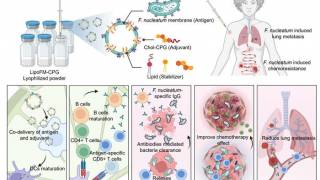Melanoma Vaccine Candidate Reports 73% Disease-Free Survival Rate

An Austin based biopharmaceutical company announced the presentation of an analysis of the prospective Phase IIb clinical trial evaluating its personalized tumor lysate, particle-loaded, dendritic cell (TLPLDC) vaccine.
The TLPDC vaccine candidate is focused on cancer patients with Stage III and IV resected melanoma.
In this small study of 144 participants, the primary endpoint was 24-month disease-free survival (DFS). The analysis was performed on the intent-to-treat (ITT) population and per treatment (PT) population, which included all patients who completed the primary TLPLDC or placebo vaccine series at 6 months.
In the PT analysis, 24-month DFS improved among Stage IV patients in the TLPLDC vaccine group compared to placebo (73.0% vs. 0%; p=0.002) representing a statistically significant and clinically meaningful reduction in the relative risk of disease recurrence for these patients.
An improvement was also seen in the ITT analysis (43.0% vs. 0%; p=0.098). Stage IV patients were more likely to receive checkpoint inhibitor therapy (50% vs. 26%, p=0.003).
At the 24-month assessment, a difference in DFS between the vaccine and placebo arms was not observed in Stage III patients.
This is important news since skin cancer patients with Stage III disease often take longer to experience a recurrence than patients with Stage IV disease, therefore a 36-month assessment of DFS will determine the effect of treatment in this population.
Additionally, while not statistically significant due to the sample size, a clinically meaningful improvement in 24-month DFS was observed between patients receiving the vaccine in combination with standard-of-care checkpoint inhibitors versus checkpoint inhibitors alone.
"Patients with Stage III and IV melanoma who have completed initial treatment have a very high risk of having their disease return, representing a serious unmet medical need," said Mark B. Faries, M.D., co-director of the Melanoma Program and head of Surgical Oncology at The Angeles Clinic and Research Institute, an affiliate of Cedars-Sinai and principal investigator of the study, in a company press release.
"Achieving a 73 percent disease-free survival rate in this extremely challenging stage of the disease is significant.”
“Importantly, in this study, we see that checkpoint inhibitors, when combined with a cell-based vaccine such as TLPLDC, may produce a synergistic anti-tumor response.”
“The goal of this type of approach is to increase patient responses and prevent disease recurrence."
As previously reported by the company on November 23, 2019, treatment with the TLPLDC vaccine was well-tolerated with 31.7 percent of placebo patients and 35.9 percent of TLPLDC patients experiencing a related adverse event, the majority of which were grade 1 or 2.
"Based on the encouraging data from this study, and recent End-of-Phase II discussions with the FDA, we are planning for a registration-enabling study of the TLPLDC vaccine in this high unmet need population of patients with Stage III and IV melanoma," said Buddy Long, chief executive officer of Elios Therapeutics.
"We continue to focus on our mission to bring this safe and effective treatment to patients with melanoma as soon as possible."
This clinical study will continue as designed to achieve the 36-month landmark secondary endpoints of DFS and overall survival (OS), which are anticipated in June 2020.
The TLPLDC vaccine is a personalized treatment that is created using a patient's own blood and tumor cells.
Samples are collected at resection, frozen, and sent to the lab where they are used to create autologous tumor lysate, which is loaded into yeast cell wall particles (YCWP).
This combination is then introduced to the patient's dendritic cells, leading to the creation of the final TLPLDC vaccine. The time from resection to injection of the vaccine takes approximately three weeks.
According to the Centers for Disease Control and Prevention (CDC), melanoma is more likely to grow and spread than other types of skin cancer.
In the U.S, the incidence of melanoma has increased over the past decades, with 91,270 estimated new cases and 9,320 related deaths in 2018.
When diagnosed and treated at an early stage, melanoma has a high cure rate, however, patients with later stages of the disease carry a high risk for melanoma recurrence because some melanoma cells can remain in the body, even after surgery.
Elios Therapeutics, LLC, is a biopharmaceutical company developing a portfolio of innovative personalized therapeutic cancer vaccines targeting unmet medical needs across a broad range of tumor types.
Personalized therapeutic cancer vaccine news is published by Precision Vaccinations.
Our Trust Standards: Medical Advisory Committee
- Multi-institutional, prospective, randomized, double-blind, placebo-controlled phase IIb trial of the tumor lysate, particle-loa
- Phase IIB TL + YCWP + DC in Melanoma
- A Novel Approach to Dendritic Cell Delivery & T-cell Activation
- Elios Therapeutics Presents New Phase IIb Data for Personalized Cancer Vaccine in High-Risk Melanoma Patients

























